How to stop gambling Addiction
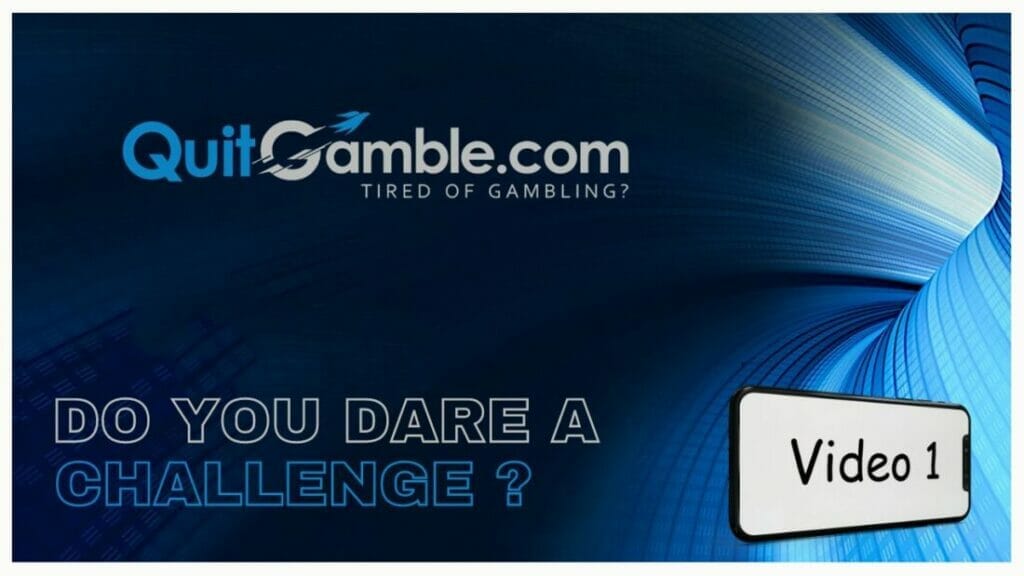
Once an addict, always an addict – Screw That! The moment has come to rethink how to stop gambling! You can accept old beliefs or challenge yourself. Let’s kick addiction’s Ass! Here are our 9-steps on how to stop gambling addiction:
- Understand why you gamble
- Forgive yourself
- Build motivation to stop gambling
- Create change
- Find support from others.
- Work on the underlying causes.
- Engage in a community.
- Take responsibility for the consequences of your gambling
- Celebrate yourself
#NotAlone – You’re not alone anymore! Welcome to join the movement to support people with gambling problems. The community has 1000s members already! #Push, #Promise – Push through this guide, and we promise you’re a huge step closer to kicking addiction’s ass! #Videos – Text is boring – So we’ve filled this guide with videos! Here are some examples.
#NewApproach – If you want to hit me, I understand… – We believe gambling is doing something for you. That’s the reason it’s so difficult to stop gambling. You don’t gamble because you’re stupid. Gambling is doing something for you! The key is understanding what that something is. Let’s dig into that in the first step!
1. Understand Why You Gamble
The answer to how to stop gambling addiction starts with understanding what gambling does for you. #Pain – We believe pain is the cause of addiction. Gambling, drugs, and alcohol are effective ways to escape the pain. In the literature, this phenomenon is called escapism (1). When we gamble, it’s easy to forget a stressful life, that we’re alone, or a painful experience from the past. No wonder gambling seems so addictive.
Do you use gambling to escape?
#HappinessTest – We developed a unique stop gambling test. We call it the Happiness Test. The test will not tell you if you’re addicted to gambling. Instead, it’ll help you understand what causes pain in your life. Perhaps it’s stress, loneliness, a meaningless job, self-doubt, or boredom. Maybe it’s something else? Multiple studies show a correlation between loneliness and addiction (2). Perhaps loneliness is why a person gambles in the first place?!
Do you think a lonely person would gamble less if he got interesting new friends to hang out with?
Another method to understand what gambling is doing for you is to study the moment you gamble. Ask yourself the following questions:
- What happens when you gamble?
- Does it create a moment of peace?
- A period when nothing else matters?
Perhaps the answers can explain why it’s so hard to quit gambling.
These questions are surprisingly difficult to answer. Most answers we get are related to the consequences gambling can have:
- “I’ve lost everything; gambling has destroyed my life.”
- “When I win, I’m happy.”
- “I’m losing control when I’m gambling; I can’t stop.”
The consequences of gambling explain why a person wants to stop gambling, but for now, we want to understand why you’re gambling. Try to finish the following statements:
- When I’m gambling, I’m thinking of…
- When I’m gambling, I’m feeling…
- When I’m gambling, I’m not feeling… (or thinking)
Sometimes it’s easier to identify what we don’t think or feel.
*If you download the How to stop gambling addiction template, we’ll supply more questions/statements to help you answer the 3rd question.
Act now – 3 things you can do:
- Do the Happiness Test
- Get the How to stop gambling template.
- Answer the questions about what happens when you gamble.
Support tools:
- Day 1 of Welcome Challenge for new members (highly recommended)
- The Happiness Test
- 5 whys – Find the root cause
2. Forgive Yourself
Reading between the lines in the problem gambling communities, people scream their frustration, regret, shame, guilt, and even self-hatred. Can you recognize that? These feelings are excruciating and block us from learning from our mistakes.
If you spent some time with the questions in step 1, you know you gamble for a reason. You’re not gambling because you’re a bad person. You’re probably gambling to escape from something: Gambling is the best way your brain knows to escape the pain.
In our gambling relapse guide (recommended read), we work with self-empathy through a technique called Nonviolent Communication, NVC (3). When we use self-empathy while analyzing something we regret, we can transform painful feelings like anger, frustration, and self-loathing into mourning. Please look at the following video:
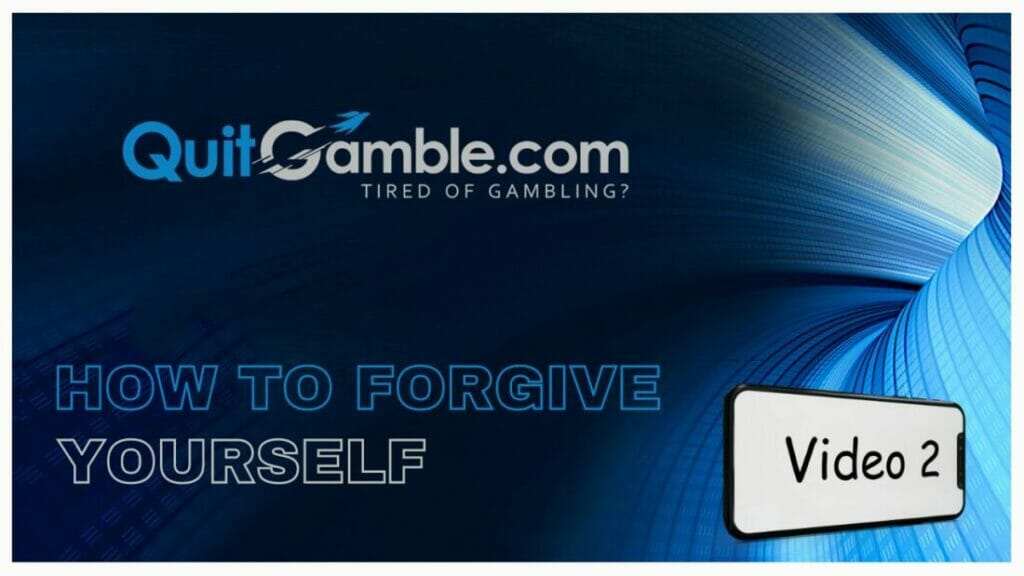
It’s okay to be sad and mourn the mistakes we’ve made. These feelings are strong catalysts for change. Change because we want to change, NOT because anyone else tells us we must change. It’s the same when we want to stop gambling online.
Take Action – 3 things you can do now:
- Check out how Samantha applied self-empathy to her gambling in the relapse guide.
- Apply the 4 steps of self-empathy to your situation.
Support tools:
- NVC Course (Find on members platform)
- Relapse guide
3. Build Motivation To Stop Gambling
#Motivation – Do you really want to quit gambling? Why? This section aims to help you boost your motivation to stop gamble. How to stop gambling urges begins with a solid reason for the change.
Take some time to write down why you want to quit gambling. Here are a few questions that might be useful:
- Why do you want to stop gambling?
- What negative consequences does gambling have today?
- What happens if you don’t stop?
- What would it mean to you if you didn’t gamble anymore?
- What could you do instead?
We’ve created a video course on building a change plan. The following video comes from lesson 2.
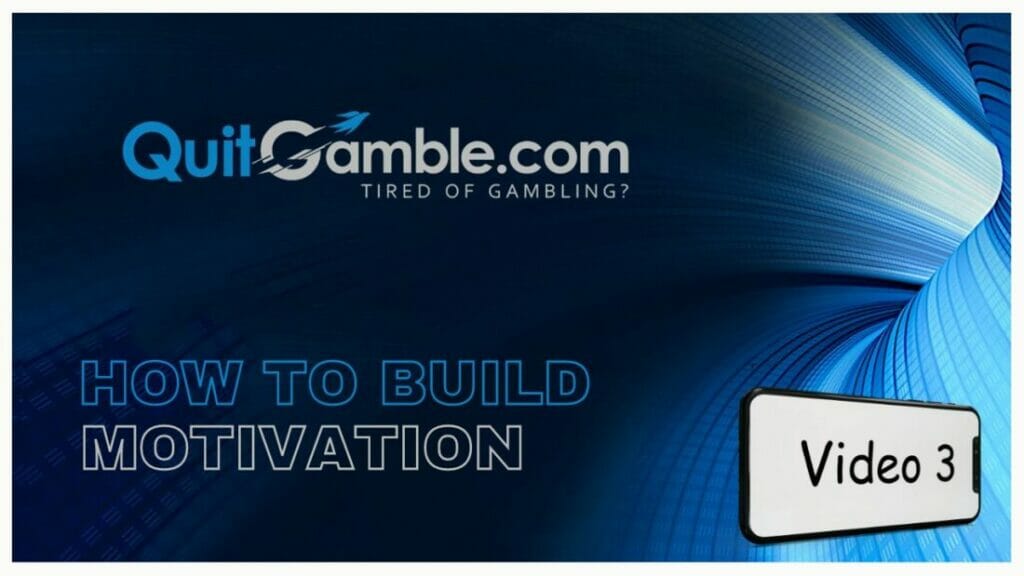
Staying away from gambling is important, but long term, you need to understand and work on the underlying causes of the gambling addiction. That’s the best way how to stop gambling addiction altogether.
Act now – 3 things you can do now:
- Write down 5 reasons you want to stop gambling.
- Answer the questions above.
- Watch the video about the gambling addiction curve.
Support tools:
- The Change Plan program
- Read others’ shared stories and experiences (see stories on members’ platform)
- Gambling addiction curve
4. Create the Change to stop Gambling
Most fail to stop gambling because they try to escape the problem. They don’t work on the underlying causes of the addiction. They manage to stay away from gambling for some time, but end up relapsing. DON’T MAKE THE SAME MISTAKE!
Albert Einstein once said: The definition of insanity is doing the same thing over and over and expecting different results. To stop gambling, look at other areas of your life and see what changes you must make. Here are a few places you can look at:
- What do you do in your free time?
- Your relationship to money.
- The people you have around you.
- What do you think about the future?
- What activities do you involve yourself in?
You probably read about people going to rehab to “sober up.” It works for a while, but they fall back into destructive behavior. One reason they succeeded at rehab was the change of scenery. But when they returned home, they also returned to their environment and all the old triggers. If you want to succeed, you need to change those things that got you addicted in the first place.
How to stop the gambling urges
You’ve probably heard about gambling triggers. A trigger is something that triggers you to think about gambling. On QuitGamble.com, we define gambling addiction as:
“If a person experiences pain and then feels an urge to gamble, he/she is a gambling addict. “
#Triggers – Pain can trigger, but other things trigger you to think about gambling. Triggers are individual and can be internal, like feelings, thoughts, and memories, and external things like a commercial, someone saying something, or even a smell. If you have ever walked by a bakery and smelled freshly made cookies, you know what we mean.
One way to withstand the gambling urge is to become proactive instead of reactive. When you work proactively, you look into the future for situations when you might get an urge to gamble and create strategies to help you withstand the urge. For example:
Situation:
You pass the casino on your way home from work every day. Every time, you feel the pull of the slot machines.
Preventive strategies
- Take a different route home from work, which has no casinos.
- You can distract yourself by listening to an exciting book/podcast.
- You can call a friend on the way home from work.
The following video is part of creating a change plan program, lesson 1.
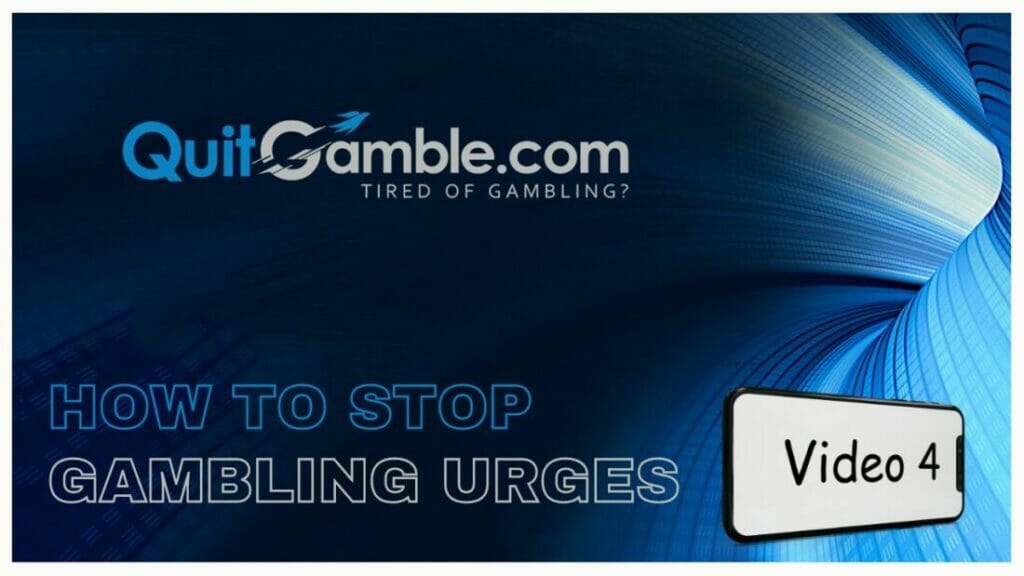
The course is free for all members! You can access it via the members’ pages. The program will help you build the first version of your change plan.
Act now – 3 things to do:
- Watch the video above
- Write a letter to yourself with the changes you want to make.
- In which situations is it likely you’ll feel the urge to gamble?
- Write down three things you can do next time you feel the urge to gamble.
Support Tools:
- The full course in how to create a change plan.
- The book Change Anything: The New Science of Personal Success.
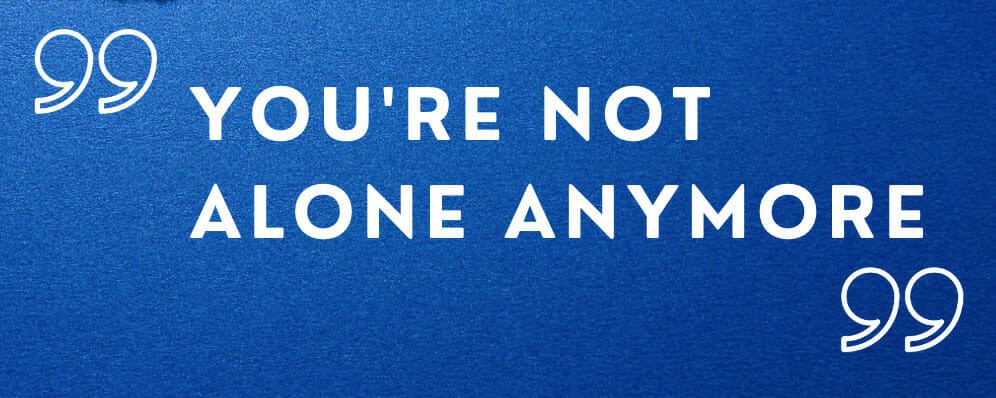
5. Find Support In Others
#Community – Gambling addiction is lonely, but you’re not alone anymore! It’s easy to feel lonely with a problem. Feelings like shame, guilt, and fright may prevent us from seeking help and support. QuitGamble.com is an online community for people who want to stop gambling addiction. #Anonymous – You can be completely anonymous and don’t need to admit to any gambling problems. You can:
- Chat, and make friends.
- Read others’ shared experiences.
- Ask questions, discuss concerns, and the best praxis to handle your gambling problem.
- Work with different courses to lower gambling urges.
#Family, #Friends – Another important support is people close to you: friends, family members, or colleagues. We know it’s hard, but the closer support you get, the higher the chances you manage how to quit your gambling addiction.
Check out the Nonviolent Communication course on the problem gambling platform. The course will help you communicate more effectively with your family and friends. It’s a valuable tool for learning about your feelings and needs. NVC isn’t about finding excuses; it’ll help you understand and explain why you gambled. You can also read our affected others guide.
Gamblers Anonymous have support meetings around the world. For physical support groups and meetings, Gamblers Anonymous is an excellent choice. There are also Facebook groups you can join. Here is an article about the differences between GA and QuitGamble.com
None of the groups above has support staff trained in dealing with suicidal people. If you’re suicidal, please google the “Suicide hotline close to me”. The people working on these hotlines are specialists in dealing with these situations. You can also contact a psychologist for support.
Act now – 3 things to do:
- Check out the members’ page to see if QG can support you.
- Read the Affected Others’ guide.
- Talk to someone close to you.
Support tools
- Affected others guide
- Quit Gamble Community
- Nonviolent communication course
- Google “Gamblers Anonymous” to find a meeting close to you
6. Work On The Underlying Causes
#Key, #Escape – We believe pain is the cause of addiction, and we use gambling to escape the pain. Suppose you can relate to that, finding and eliminating sources of pain would positively affect your chances of stopping gambling. Working on the underlying causes of the addiction is the answer to how to stop gambling online.
So, what causes pain in your life? Spend time thinking about it. You can ask yourself questions like:
- Do I often feel lonely?
- Am I constantly stressed?
- Does my life feel meaningful?
- Am I often bored?
If you need some help, you can take the Happiness Test. It’ll give you an indication of where to look. You can also use the questions we mentioned in the beginning. What is gambling doing for you? What happens when you gamble?
Through self-help courses, it’s possible to target sources of pain and transform these situations into times of joy that add value to your life. If you often feel lonely, you can learn new ways to find interesting people and spend time with them. It requires some effort on your part, and it may take some time, but if you’re persistent, you can do anything you want.
As a member of QG, you can access the following courses.
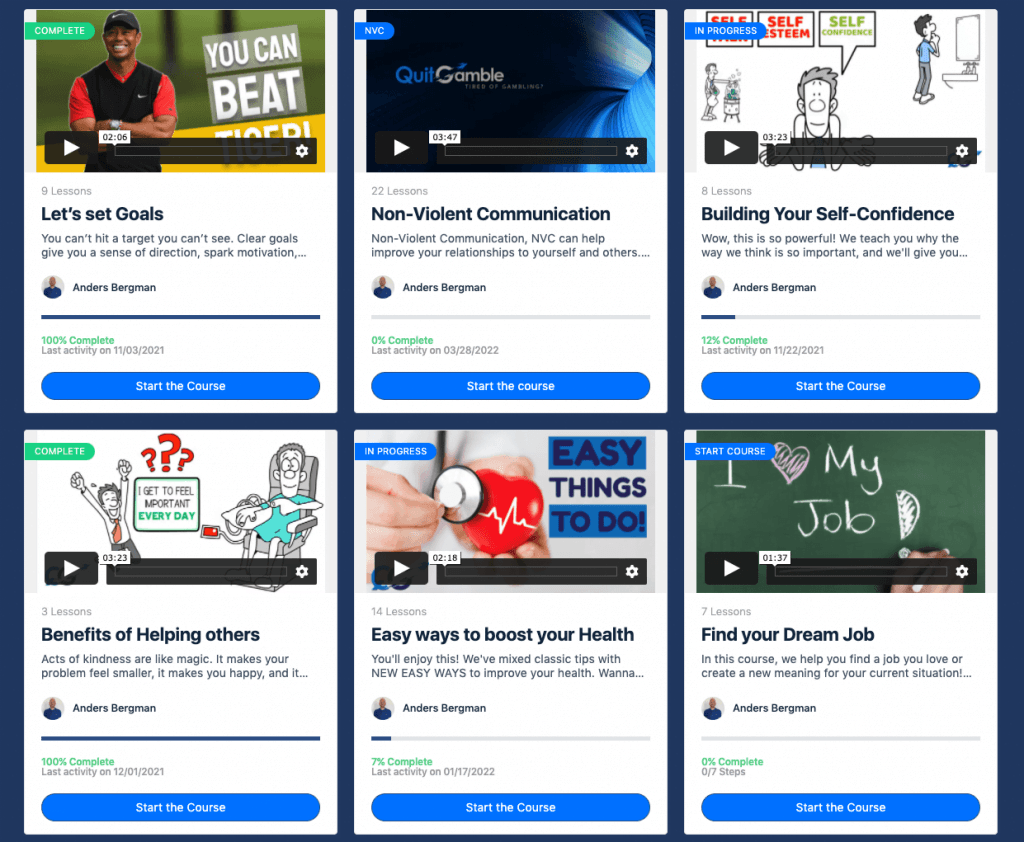
QG is just one platform. There are thousands of self-help programs on platforms like Udemy or Skillshare. If you want to learn something, these platforms can be helpful, even if you must pay for the courses.
Act now – 3 things to do:
- If you haven’t done the Happiness Test, you can do it now.
- List 3 things that cause you agony today.
- Write down 3 things you can do to counter that pain or take one of the courses on the member’s platform.
Support tools:
- The Happiness Test
- Choose among 15 different courses on the members’ pages.
7. Engage In A Community – Help Yourself By Helping Others.
#TedTalk – In the famous TED talk, “Everything you think you know about addiction is wrong.” (4), Johann Hari says:
“The opposite of addiction is not sobriety. It’s connection.”
#Engage – We want to encourage you to engage in any community. The QG community is one option, but connecting with others is the most important. What are you interested in? Follow your interests and join a group of people with similar interests. These communities are full of friendly, open-minded, and kind people.
There is incredible power in helping other people.
When you give of yourself and help others without thinking about what you can get from them, magic happens inside your brain. #Oxytocin – Kindness releases the happiness hormone Oxytocin (5). Oxytocin is like dopamine, a pain killer. That’s why we experience our problems and pain as more minor when focusing on others (6). We strongly recommend you explore this phenomenon for yourself. Try something simple as:
- Helping someone cross the street.
- Give food to a homeless person.
- Or take a bag and pick up some trash on your next walk.
It’s a beautiful video about how helping people can change your entire life.
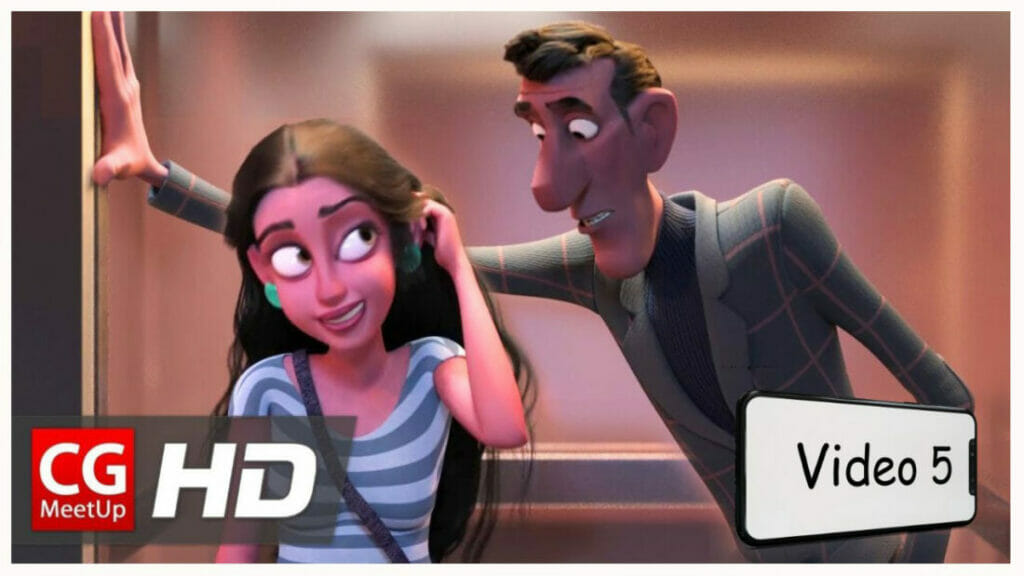
Suppose you’re afraid of sharing your gambling problem with somebody close to you. Engaging in a community can help you make new friends. It might be easier to talk to these people.
Act now – 4 things to do:
- Watch Johann Hari’s famous Ted Talk.
- As a member of QG, share your story, or start commenting on other people’s posts. Your opinion, empathy, and engagement can help other users in their struggles.
- List things you can do for others over the next week and do at least one thing per day. Notice the feelings it creates in you.
- List 5 interests of yours and look for local communities or clubs for people with similar interests.
Support tools:
- The QG community
- In the sidebar on the members’ platform, you find tips on things you can do for other people.
- Beat Loneliness Course (free for all members)
Let’s ask the question again: How do I stop gambling addiction? Help people around you, and your own problems and stress will feel smaller. You’ll feel energized and happier and can’t wait to do it again. It sounds like a pretty good tool to add to your arsenal when fighting gambling addiction, right? Engage in communities, help other people, and you’ll enjoy the magic too!
8. Taking Responsibility For The Consequences Of Your Gambling
#Responsibility – We can’t change the past, but we can take responsibility for our past actions. We talked about the importance of forgiving yourself. In step 8, we look at the consequences of gambling and what you can do to decrease the pain these consequences continue to cause.
Common consequences of gambling addiction:
- Financial problems and debt
- Lost trust in yourself
- Bad self-confidence and self-esteem
- General health problems
Long-term gambling problems often have negative consequences for the people around too.
- Broken trust
- Unpaid loans
- Lies
- Lost friendships
- Broken relationships.
These consequences will continue to cause a lot of pain. In fact, they might be the main reason behind your gambling urges today. (Remember, we believe pain is the cause of addiction. Every time we feel pain, we want to escape it with gambling.)
#HugePotential – It’s tough to think about the negative consequences of gambling, BUT working and fixing these consequences will help you tremendously on your journey to becoming gambling free.
Again, we can’t change the past. We can rebuild and do our best to repair the damage that’s been done. If you need help dealing with gambling debt, you can read our gambling debt guide.
The Nonviolent Communication course has a lesson on using NVC in recovery. Part of that is to heal broken relationships and bad past experiences. Broken trust takes time to repair, and sometimes we need to accept that a person doesn’t want anything to do with us anymore.
The consequences of your past gambling will continue to cause pain until you do something about them. If you never want to gamble again, dealing with these sources of agony is just as important as handling boredom, stress, anxiety, and loneliness.
Act now – You can do this:
- List the negative consequences gambling has caused you. It’ll be painful, but when you’ve done it. You have a robust list to start working with.
Support tools:
- Gambling debt Guide
- Nonviolent communication course
9. Celebrate Yourself
Quitting gambling requires a lot of work. Let’s try to make the process more enjoyable. In the third step, we talked about motivation. One way to stimulate motivation is to use incentives. When you’re doing something challenging, you should celebrate yourself for every achievement you make.
Be proud of yourself, and give yourself a high-five for going through this how to quit gambling addiction guide. (We know it’s long.) Knowing that you have something fun to look forward to can help you do that extra exercise or choose to go for a walk instead of picking up the phone (it might be a trigger).
We talk about incentives in the Creating A Change Plan program’s fifth lesson. If you want inspiration, watch the following video:
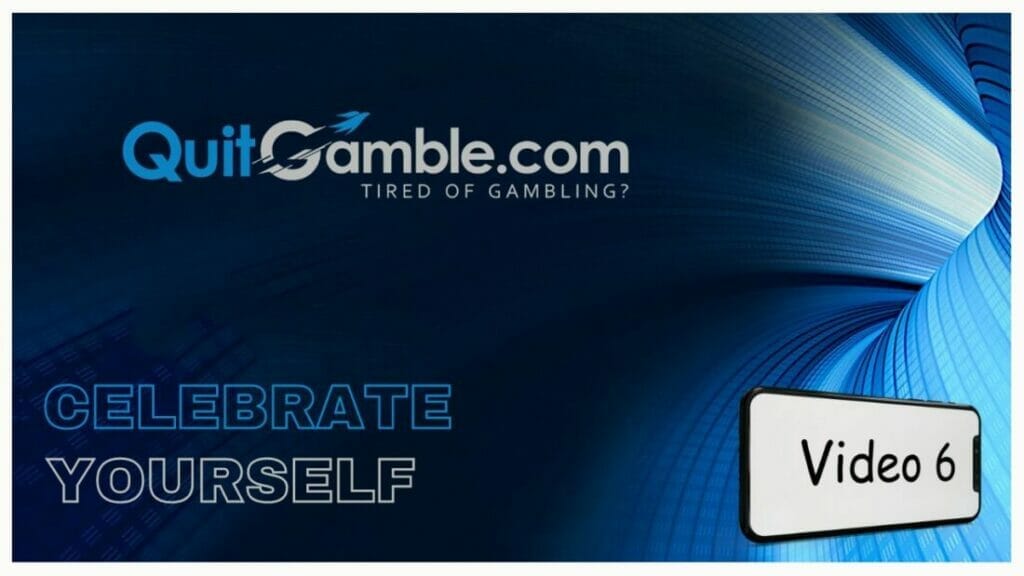
Act now – 2 things you can do:
- Give yourself another high-five for taking the first steps to becoming gambling free.
- Spend some time thinking about appropriate incentives for you. How do you want to celebrate your achievements?
Support tools
- Our goal-setting course
- Change plan program
Sources – How to Stop Gambling:
(2) Exploring the Loneliness and Internet Addiction Level of College Students Based on Demographic Variables Contemporary Educational Technology 2019
(3) Center for Nonviolent Communication
(4) Johann Hari Everything you think you know about addiction is wrong
(6) Oxytocin, an Opioid Alternative, Ready for Regular Clinical Use to Manage Chronic Pain, Forest Tennant, MD, DrPH, 2017